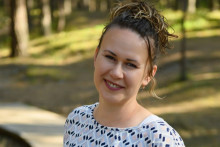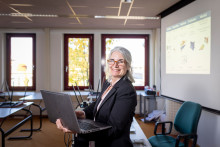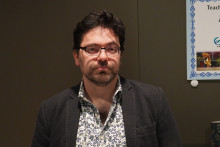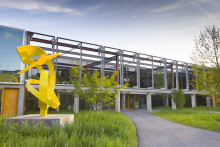Bockarjova views her dismissal notice with composure. ‘No, I’m not angry or bitter. Of course I’m shocked and disappointed, and it does make you reflect. I genuinely believe the faculty board has misjudged the situation. Perhaps my mistake was being too invisible. I’m not the type to post on LinkedIn or to show off my results. They looked at the output in the systems, but titles of papers, presentations, and lectures say little about their substance. Besides, many of my projects are still ongoing, so their output is yet to come.’
Social relevance
What exactly does she do? ‘In essence, I provide the economic underpinning for the societal impact of projects, linking them to GIS data. My research helps to explain the social support behind many of ITC’s activities. I teach students how to connect their GIS knowledge and skills to socio-economic reasoning, so they can translate the impact of their analyses for audiences outside academia.’
She now supervises several master’s students who specifically chose her track, and she actively lobbies for collaborations within this theme. ‘We link economic value to the social impact of sustainability. I believe this is an important strategic pillar for the faculty,’ she says confidently.
At home in the Netherlands
Bockarjova speaks Dutch fluently. That makes sense; the Latvian-born researcher has lived here for twenty years and recently settled in Enschede with her husband and three children. ‘I feel at home here.’ Her stable home life allows her the peace and space to focus on the period ahead. ‘It won’t be pleasant, I think.’
She came to the Netherlands from the University of Latvia in Riga to study the economic consequences of large-scale disasters, such as flooding. ‘The level of research here was much higher than in the Baltic states, especially shortly after the collapse of the Soviet Union.’ She completed her PhD at UT, then held several temporary university positions across the country.
‘This is my thing’
Five years ago, she was given the opportunity to start her own research line as an assistant professor in Land and Urban Economics within the Department of Urban and Regional Planning and Geo-information Management. ‘When I first came to the Netherlands, I barely knew what I wanted to do. That’s why I moved around between universities. But when I succeeded the late Anne van der Veer, the pieces finally fell into place. This is exactly what I want. It connects climate change, urban development, nature, and natural disasters to societal impact. This is my thing.’
‘A waste of time’
Her newly found direction had just begun to bear fruit. ‘I was in a good flow, developing new teaching components and projects, for example within ECIU, and leading a HORIZON proposal. The first results are already coming in. That’s why this is such bad timing. It feels like a delay. I just want to keep going. I’m still working in Langezijds, but everything is uncertain. For example, I’m receiving invitations for conferences next year, and right now I can’t give any definitive answers.’
What bothers her most, besides the uncertainty, is the energy it will take to challenge the decision. ‘I’d rather spend that time building towards the future. This really feels like a waste of time.’
She remains pragmatic. ‘I haven’t been dismissed yet; I’m under threat of dismissal. That’s an important difference. In the coming period, I want to carefully gather all the facts to show why my expertise is both relevant and indispensable to the faculty, and how it fits at the very heart of ITC’s strategic vision.’






